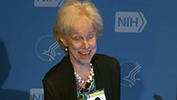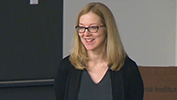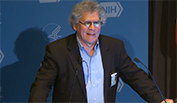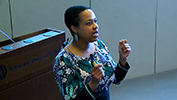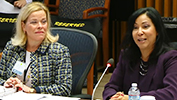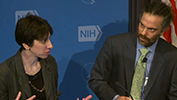-
- NIH VideoCast - 1) Human Brain Bank at NIMH: A New Resource for Brain Studies and 2) Psychiatric Genetics: The Genetic Architecture of Mental Disorders
-
- - 1) Barbara K. Lipska, PhD, Staff Scientist and Director of the Human Brain Collection Core, NIMH, NIH and 2) Thomas Lehner, PhD, MPH, Director, Office of Genomics Research Coordination, NIMH, NIH (2017/04/20)
- - Category : Clinical Center Grand Rounds
- 1) Human Brain Bank at NIMH: A New Resource for Brain Studies and 2) Psychiatric Genetics: The Genetic Architecture of Mental Disorders
For more information go to http://www.cc.nih.gov/about/news/grcurrent.html
NIH VideoCast - 1) Human Brain Bank at NIMH: A New Resource for Brain Studies and 2) Psychiatric Genetics: The Genetic Architecture of Mental Disorders
-
- NIH VideoCast - Interagency Coordinating Committee on Fetal Alcohol Spectrum Disorders (ICCFASD) - April 2017
-
- - National Institute on Alcohol Abuse and Alcoholism, NIH (2017/04/19)
- - Category : Advisory Board Meetings and Workshops
- General Public Interagency Coordinating Committee on Fetal Alcohol Spectrum Disorders (ICCFASD) meeting (open to the public)
For more information go to https://www.niaaa.nih.gov/about-niaaa/our-work/interagency-coordinating-committee-fetal-alcohol-spectrum-disorders
NIH VideoCast - Interagency Coordinating Committee on Fetal Alcohol Spectrum Disorders (ICCFASD) - April 2017
-
- NIH VideoCast - Celebrating The Legacy Of The NIMH Child Psychiatry Branch Chief, Judith L. Rapoport, M.D.
-
- - NIMH, NIH (2017/04/19)
- - Category : Conferences
- This one-day symposium will celebrate decades of neurodevelopmental, neurobiological, and clinical research conducted by the Child Psychiatry Branch, led by Judith Rapoport, M.D. at the NIMH Intramural Research Program.
NIH VideoCast - Celebrating The Legacy Of The NIMH Child Psychiatry Branch Chief, Judith L. Rapoport, M.D.
-
- NIH VideoCast - Neural Circuits for Reward Learning
-
- - Patricia Janak, Ph.D., Bloomberg Distinguished Professor, Department of Psychological & Brain Sciences, Johns Hopkins Solomon H. Snyder School of Medicine (2017/04/19)
- - Category : Neuroscience
- NIH Neuroscience Series Seminar
Dr. Janak???s lab is interested in the behavioral and neural mechanisms of associative learning, the simple learning of relations between environmental stimuli and the outcomes they predict (Pavlovian learning), and between motor actions and the outcomes they produce (Instrumental learning). These simple learned associations guide our behavioral response to the environmental stimuli that continually surround us. Associative learning also provides a means whereby stimuli in the environment come to regulate our emotional responses and to strongly bias our decision-making. Thus Dr. Janak???s lab seeks to define the behavioral and neural mechanisms for the acquisition of reward-based associations. In addition, they are interested in the neural systems that control expression of stimulus-guided behavior after learning. Because associative learning mechanisms contribute to pathological behaviors such as drug and alcohol addiction and overeating, an additional focus of their work is translational. In these studies, they apply their findings on associative learning to understand better how drug- and alcohol-associated stimuli contribute to relapse. To realize their basic and translational goals, they use well-defined animal models of learning and addiction in concert with in vivo electrophysiological measurement and optogenetic manipulation of neuronal populations in specific brain regions and circuits.
For more information go to https://neuroscience.nih.gov/neuroseries/home.aspx
NIH VideoCast - Neural Circuits for Reward Learning
-
- NIH VideoCast - QIN 2017 Meeting (Day 2)
-
- - NCI, NIH (2017/04/18)
- - Category : Conferences
- The Quantitative Imaging Network is a network of academic research teams organized to create methods to analyze medical images to assist in prediction of response to cancer therapies in clinical trials. The annual meeting provides the opportunity to exchange ideas, data, and recent technical advances. Key words that mark the network as unique include: quantitative imaging, response to therapy, imaging algorithms, imaging informatics, and clinical trial response tools.
NIH VideoCast - QIN 2017 Meeting (Day 2)
-
- NIH VideoCast - Demystifying Medicine 2017: Alzheimer: What, When and How
-
- - Mark Mattson, PhD, NIA, NIH and Dimitrios Kapogiannis, MD, NIA, NIH (2017/04/15)
- - Category : Demystifying Medicine
- The Demystifying Medicine Lecture Series is designed to help bridge the gap between advances in biology and their applications to major human diseases. Each lecture will feature a presentation on a major disease, including current research and advancements on treatments.
For more information go to https://demystifyingmedicine.od.nih.gov
NIH VideoCast - Demystifying Medicine 2017: Alzheimer: What, When and How
-
- NIH VideoCast - Contemporary Clinical Medicine: Great Teachers Evolution, Biology and Rare Mendelian Phenotypes
-
- - David Valle, MD, Henry J. Knott Professor and Director, McKusick-Nathans Institute of Genetic Medicine and Professor of Pediatrics, Ophthalmology, and Molecular Biology and Genetics, Johns Hopkins University School of Medicine (2017/04/15)
- - Category : Clinical Center Grand Rounds
- Contemporary Clinical Medicine: Great Teachers
Evolution, Biology and Rare Mendelian Phenotypes
For more information go to http://www.cc.nih.gov/about/news/grcurrent.html
NIH VideoCast - Contemporary Clinical Medicine: Great Teachers Evolution, Biology and Rare Mendelian Phenotypes
-
- NIH VideoCast - QIN 2017 Meeting (Day 1)
-
- - NCI, NIH (2017/04/13)
- - Category : Conferences
- The Quantitative Imaging Network is a network of academic research teams organized to create methods to analyze medical images to assist in prediction of response to cancer therapies in clinical trials. The annual meeting provides the opportunity to exchange ideas, data, and recent technical advances. Key words that mark the network as unique include: quantitative imaging, response to therapy, imaging algorithms, imaging informatics, and clinical trial response tools.
NIH VideoCast - QIN 2017 Meeting (Day 1)
-
- NIH VideoCast - Pain and Opioid Management in Veterans: Evidence, Lessons Learned, and Future Directions in the Use of Collaborative and Integrated Care Approaches
-
- - Karen H. Seal, MD, MPH, Professor, Departments of Medicine and Psychiatry, University of California, San Francisco, Director, Integrated Pain Team, Integrated Care Clinic for Iraq and Afghanistan Veterans, San Francisco VA Medical Center (2017/04/12)
- - Category : National Center for Complementary and Integrative Health
- NCCIH Integrative Medicine Research Lecture Series
The National Center for Complementary and Integrative Health (NCCIH) presents the Integrative Medicine Research Lecture Series. The series provides overviews of the current state of research and practice involving complementary health approaches and explores perspectives on the emerging discipline of integrative medicine.
Karen Seal, MD, MPH is a professor of medicine and psychiatry at the University of California, San Francisco. She is based at the San Francisco VA Health Care System (SFVAHCS), where she is director of the Integrated Care Clinic for Iraq and Afghanistan Veterans and director of the Integrated Pain Team (IPT) Clinic.
Dr. Seal will discuss an ongoing pilot randomized control trial involving veterans with chronic pain and high-risk prescription opioid use, which aims to examine pain- and opioid-related outcomes resulting from biopsychosocial, nonpharmacologic care including motivational interviewing, shared decision-making and ???SMART??? goal planning as part of a multi-modal pain care plan.
Dr. Seal???s research focuses on developing and testing new integrated care interventions to address comorbid mental and physical health problems, including chronic pain and opioid misuse among veterans.
Currently, she is the principal investigator (PI) of two pragmatic effectiveness trials testing the implementation of telephone motivational coaching to achieve engagement in mental health treatment among rural veterans (???COACH???) and in the other (???OPTI???), decreased reliance on prescription opioids among veterans with chronic pain. She recently assumed the role of co-PI on a recently funded nine-site national Patient-Centered Outcomes Research Institute (PCORI) study, which is a comparative effectiveness trial of an integrated pain team approach, modeled after the SFVAHCS IPT Clinic, versus telephone collaborative management to improve pain and decrease opioid use among veterans who use the VA. This past year, Dr. Seal was appointed chair of the SFVAHCS Integrative Health Advisory Committee to promote the development of complementary and integrative health services for veteran patients and VA staff in her system.
For more information go to https://nccih.nih.gov/news/events/IMlectures
NIH VideoCast - Pain and Opioid Management in Veterans: Evidence, Lessons Learned, and Future Directions in the Use of Collaborative and Integrated Care Approaches
-
- NIH VideoCast - Motor circuits for listening and learning
-
- - Richard Mooney, Ph.D., George Barth Geller Professor of Neurobiology, Department of Neurology, Duke University, School of Medicine (2017/04/12)
- - Category : Neuroscience
- NIH Neuroscience Series Seminar
For more information go to https://neuroscience.nih.gov/neuroseries/Home.aspx
NIH VideoCast - Motor circuits for listening and learning
-
- NIH VideoCast - Drug Metabolism, Pharmacogenetics and the Quest to Personalize HIV Treatment and Prevention
-
- - Namandj?? N. Bumpus, Ph.D., Associate Professor of Medicine???Division of Clinical Pharmacology, The Johns Hopkins University School of Medicine (2017/04/11)
- - Category : Special
- 2017 NIGMS Director`s Early Career Investigator Lecture
Dr. Bumpus describes how her lab examines the metabolism and distribution of antiretroviral drugs and probes the effects of these metabolites on cellular signaling pathways, with the overarching hypothesis that through integrating a mechanistic understanding of the metabolism and distribution of antiretroviral drugs in cells and tissues, we can move toward being able to predict drug responses in a given individual.
NIH VideoCast - Drug Metabolism, Pharmacogenetics and the Quest to Personalize HIV Treatment and Prevention
-
- NIH VideoCast - Innate allergy
-
- - Dr. Richard Locksley, Sandler Distinguished Professor, Howard Hughes Medical Institute Investigator, Director, Sandler Asthma Basic Research Center, University of California San Francisco (UCSF) (2017/04/11)
- - Category : Immunology
- Immunology Interest Group Seminar Series
Despite clear roles for classical arms of immunity in maintenance of a healthy commensal microbial flora and protection from invasive pathogenic organisms, the purpose of allergic immunity, which underlies increasingly prevalent diseases like food allergy, asthma and atopic dermatitis, remains puzzling. The discovery of innate lymphoid cells that are programmed to produce cytokines associated with allergic immunity has provided new opportunities to assess basal physiologic processes that involve this canonical tissue response, and may reveal opportunities for re-tuning this arm of immunity to enhance health and well-being.
Richard Locksley is the Sandler Distinguished Professor, a Howard Hughes Medical Institute Investigator, and Director of the Sandler Asthma Basic Research Center at the University of California San Francisco (UCSF). He obtained his A.B. from Harvard, M.D. from the University of Rochester, Internal Medicine Residency at UCSF, and Infectious Diseases Fellowship at the University of Washington. His lab studies innate and adaptive immunity using infectious and inflammatory disease models, focusing on cytokines as critical mediators of biology. His salient contributions have elucidated the roles of cytokines as regulators of adaptive and innate immunity, and he pioneered the development of mice containing incorporated reporter systems that have enabled interrogation of the immune system in vivo. He has focused on Th2-related immunity to helminths and allergens, discovered Group 2 innate lymphoid cells (ILC2s), and delineated of the function of tuft cells as producers of IL-25 in intestinal type 2 immune responses. A major direction and focus of his seminar relates to the pathways by which type 2 immune responses are integrated into homeostasis of organs and tissues and the processes used to activate these responses in asthma, allergy, and in immunity to parasitic helminths. Dr. Locksley has served on major editorial boards and has received numerous awards and honors. He is a member of the American Society for Clinical Investigation (ASCI), Association of American Physicians (AAP), and was the first recipient of the William Paul Award for Cytokine Research by the International Cytokine & Interferon Society. Moreover, he is member of the American Academy of Arts and Sciences, a Member of the Albert Lasker Basic Medical Research Awards Jury and serves on the National Advisory Committee, Pew Scholars Program in Biomedical Sciences.
NIH VideoCast - Innate allergy
-
- NIH VideoCast - Office of AIDS Research Advisory Council meeting (OARAC) April 2017
-
- - NIAID, NIH (2017/04/11)
- - Category : AIDS Research Advisory Committee
- Meeting will surround presentations and panel discussion on The Impact of the Microbiome in HIV Prevention and Pathogenesis; an update on HIV/AIDS research from the National Heart, Lung, and Blood Institute and from OARAC Working Groups for Treatment and Prevention Guidelines.
NIH VideoCast - Office of AIDS Research Advisory Council meeting (OARAC) April 2017
-
- NIH VideoCast - World War I Centenary Forum: Stories from the Collections of the National Library of Medicine
-
- - Jeffrey Reznick, Chief, History of Medicine Division, NLM, NIH (2017/04/11)
- - Category : History of Medicine
- On April 2, 1917, US President Woodrow Wilson asked Congress to declare was against Germany, stating that ???The world must be made safe for democracy.??? Four days later, on April 6, Congress voted overwhelmingly in favor of a war declaration. The National Library of Medicine marks this important occasion with a forum that spotlights some its rich collections related to the war and the American experience of the period. Join us to hear a variety of stories drawn from these collections, as shared by our colleagues in the NLM???s History of Medicine Division.
For more information go to https://www.nlm.nih.gov/hmd/happening/lectures/lectures_2017.html
NIH VideoCast - World War I Centenary Forum: Stories from the Collections of the National Library of Medicine
-
- NIH VideoCast - Advisory Committee on Research on Women???s Health - April 2017
-
- - ORWH, OD, NIH (2017/04/06)
- - Category : Advisory Board Meetings and Workshops
- Congressionally mandated advisory committee on research on women`s health.
For more information go to https://orwh.od.nih.gov/advisory-committees/acrwh/
NIH VideoCast - Advisory Committee on Research on Women???s Health - April 2017
-
- NIH VideoCast - Demystifying Medicine 2017: Sight-threatening Uveitis: a 2-way Street between Research and Clinic
-
- - Sapna Gangaputra, MD, MPH, NEI, NIH and Mary Mattapallil, PhD, NEI, NIH (2017/04/06)
- - Category : Demystifying Medicine
- The Demystifying Medicine Lecture Series is designed to help bridge the gap between advances in biology and their applications to major human diseases. Each lecture will feature a presentation on a major disease, including current research and advancements on treatments.
For more information go to https://demystifyingmedicine.od.nih.gov
NIH VideoCast - Demystifying Medicine 2017: Sight-threatening Uveitis: a 2-way Street between Research and Clinic
-
- NIH VideoCast - Ethics Rounds: Presenting Patient Level Data: Can We Ensure Respect and Protection?
-
- - Discussant: Jonathan Kimmelman, PhD, Associate Professor, Biomedical Ethics Unit and Social Studies of Medicine, McGill University School of Medicine and Director, Studies on Translation, Ethics, and Medicine (STREAM) and Case Presenter: Jennifer Couzin-Frankel, Staff Writer, Science (2017/04/06)
- - Category : Clinical Center Grand Rounds
- Ethics Rounds: Presenting Patient Level Data: Can We Ensure Respect and Protection?
Is it problematic if patients can identify themselves in a grand rounds presentation or a scientific publication? Should consent be required to present information about individual patients and, if so, should patients be able to block presentations they don???t like? Medicine and research, from clinical rounds to grand rounds, from scientific conferences to scientific publications, rely on the presentation of individual patients. Yet, surprisingly, there are no consensus guidelines on how these issues should be handled. Please join us for discussion of a fascinating case that highlights the challenges clinicians and researchers face when trying to present patient information in a way that ensures respect and protection without undermining clinical education or clinical research.
Presenter: Jennifer Couzin-Frankel, Staff Writer, Science
Discussant: Jonathan Kimmelman, PhD, Associate Professor, Biomedical Ethics Unit and Social Studies of Medicine, McGill University School of Medicine and Director, Studies on Translation, Ethics, and Medicine (STREAM)
The program should be of interest to individuals involved in clinical care and clinical research, as well as those interested in important issues in bioethics.
For more information go to http://www.cc.nih.gov/about/news/grcurrent.html
NIH VideoCast - Ethics Rounds: Presenting Patient Level Data: Can We Ensure Respect and Protection?
-
- NIH VideoCast - Stem Cells, Aging & Aging Stem Cells
-
- - Amy Wagers, Ph.D., Forst Family Professor of Stem Cell and Regenerative Biology at Harvard University and Harvard Medical School, Senior Investigator, Joslin Diabetes Center and Principal Faculty, Harvard Stem Cell Institute (2017/04/06)
- - Category : WALS - Wednesday Afternoon Lectures
- NIH Director???s Wednesday Afternoon Lecture Series
A leader in the field of stem cell biology, Dr. Wagers has done groundbreaking research to uncover new migratory pathways and signaling networks that regulate the functioning of hematopoietic stem cells. Understanding how these cells function could lead to better treatments for a range of diseases including cancer, anemia, and diabetes. For her lecture, Dr. Wagers will discuss the fundamental principles that govern tissue aging and determine stem cell function in organ regeneration and degenerative disease.
The annual Florence S. Mahoney Lecture on Aging is named in honor of Florence Stephenson Mahoney (1899???2002). She devoted the last half of her life to successfully advocating for the creation of the National Institute on Aging and increased support for the NIH.
NIH VideoCast - Stem Cells, Aging & Aging Stem Cells
-
- NIH VideoCast - Strategies for Neuroprotection and Myelin Repair
-
- - Patrizia Casaccia, M.D., Ph.D., Professor, Dept. of Neuroscience and Dept. of Genomics and Multiscale Biology, Icahn School of Medicine at Mount Sinai (2017/04/05)
- - Category : Neuroscience
- NIH Neuroscience Series Seminar
Our ability to move, think, perceive, is dependent on a timely transmission of information among specialized cells called neurons. This information is sent via a series of electrical impulses that travel along specialized structures called "axons", whose ability to conduct signal is dependent on the presence of "myelin". Myelin is a fatty substance composed of lipids and proteins that is an integral component of a cell called "oligodendrocyte". Oligodendrocytes are the myelin-forming cells of the CNS and are essential for brain function. Oligodendrocytes originate from neural stem cells that undergo several changes before reaching the stage of late maturation. Dr. Casaccia???s laboratory is working in the following major research areas:
??? EPIGENETIC REGULATION of gene expression (how the environment affects the ability of DNA to express genes);
??? MYELIN FORMATION in development and in disease;
??? MECHANISMS OF NEURODEGENERATION and disease progression in MULTIPLE SCLEROSIS (towards the discovery of new treatments);
??? PERSONALIZED MEDICINE (define the effect of genes, diet, exercise, stress and social interaction in therapy responsiveness and disease manifestation.
These areas are focused on the following goals: 1) define the steps leading to the acquisition of oligodendrocyte identity, in order to correct potential deficits due to aging and pathological states; 2) understand how myelin forms during development, in order to better design protocols to instruct stem cells towards forming new myelin; 3) develop new therapies to preserve axonal function and improve recovery after myelin damage has occurred; 4) develop patient-based therapeutic approaches.
For more information go to https://neuroscience.nih.gov
NIH VideoCast - Strategies for Neuroprotection and Myelin Repair
-
- NIH VideoCast - International Symposium on Malignant Mesothelioma 2017 (Day 2)
-
- - Mesothelioma Applied Research Founation (2017/03/31)
- - Category : Conferences
- The 2017 International Symposium on Malignant Mesothelioma is the only conference of its kind to bring together scientists and patients alike. It covers topics such as mesothelioma science, treatment options, including clinical trials, immunotherapy, surgery, and pain management among many others. This conference is geared to attendees from all walks of life, including patients and their families, advocates, medical professionals, those who have lost loved ones to mesothelioma, and scientists.
For more information go to http://www.curemeso.org/site/c.duIWJfNQKiL8G/b.8598593/k.D685/Homepage.htm
NIH VideoCast - International Symposium on Malignant Mesothelioma 2017 (Day 2)





